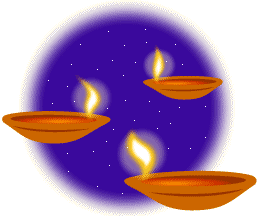| Diwali symbolizes
the victory of light over darkness. Celebrated joyously all over the
country, it is a festival of wealth and prosperity.
 The essence of this light is Shri Lakshmi-arising, at the
beginning of time, out of the waters at the churning of the Milky Ocean by
gods and demons for a thousand years. Regarded as the goddess of love,
beauty and prosperity, Lakshmi, Kamla or Padma (Sanskrit words for lotus),
the beloved consort of Vishnu, along with the dearly loved pot-bellied,
elephant headed, auspicious god of the Hindu theogony, Siri Ganesha, is a
presiding deity of the festival of lights. They are worshipped in every
household so that the year may be full of prosperity. Throughout the night
a lamp is kept burning before her image so that she may continue to dwell
in the house and bestow upon it the wealth of life. The essence of this light is Shri Lakshmi-arising, at the
beginning of time, out of the waters at the churning of the Milky Ocean by
gods and demons for a thousand years. Regarded as the goddess of love,
beauty and prosperity, Lakshmi, Kamla or Padma (Sanskrit words for lotus),
the beloved consort of Vishnu, along with the dearly loved pot-bellied,
elephant headed, auspicious god of the Hindu theogony, Siri Ganesha, is a
presiding deity of the festival of lights. They are worshipped in every
household so that the year may be full of prosperity. Throughout the night
a lamp is kept burning before her image so that she may continue to dwell
in the house and bestow upon it the wealth of life.
'Dipavali' means a row of lights ('Diwali' is simply a
corrupt form of it) and the festival is so called because of the
illuminations that mark the celebrations.
 Every Hindu home, rich or poor, it given a spring cleaning a
few days prior to the auspicious day, whitewashed and adorned in a festive
way. Rows of little earthen lamps illuminate terraces and gardens, walls
and courtyards, outer and inner precincts of a temple or a palace. That it
was so from ancient times is borne by kings and travelers who have
recorded the celebrations. Every Hindu home, rich or poor, it given a spring cleaning a
few days prior to the auspicious day, whitewashed and adorned in a festive
way. Rows of little earthen lamps illuminate terraces and gardens, walls
and courtyards, outer and inner precincts of a temple or a palace. That it
was so from ancient times is borne by kings and travelers who have
recorded the celebrations.
King Harsha described it as 'Dipapratipadotsava' and King
Bhoja calls it 'Sukharati' (happy night) and describes how Lakshmi was
venerated and worshipped at dusk and lamps lit in her honour on roadsides
and river banks, on hill and tree, in home and temple. To Jimutavahana it
was the 'vow of a happy night' (Sukharatrivarta')
Another legend speaks of how Bali was deprived of his
kingdom by Vishnu on this day. The good Daitya king, through austerities
and devotion, had defeated the great Indra himself. The gods thus feeling
humbled appeal to Vishnu for protection. Vishnu becoming manifest in his
Dwarf incarnation (Vamana) begs Bali for as much land as he (Vishnu) can
over in three steps. Having obtained the boon, Vishnu covers heaven and
earth in two strides and would have covered the world in the third, but
then respecting Bali's goodness and generosity, he stopped short and left
the nether world to the Datiya king. The legend, found in Rig-Veda, tells
of Vishnu's three strides-over earth, heaven and the nether world of
Patala, symbolizing apparently the rising, culmination and setting of the
sun. A zodiacal allegory couched in mythological terms, it points to the
setting of the light of the sun and the emergence of the darkness
associated with the lower realm. Changes of season, of course, but it
tells of the heart of a people and their unlimited delight in life, in
light, burning not outside but in the deeper recesses of the nether
regions of cosmos and man. Why else should folk recall Bali and his reign
on this day? We learn that in Maharashtra, effigies of Bali in rice-flour
and cow-dung are prepared by womenfolk who worship and invoke his
blessings. Skanda Purana also refers to Bali being worshipped with fruits
and flowers on this auspicious day by drawing this image on the ground in
different hues.
|